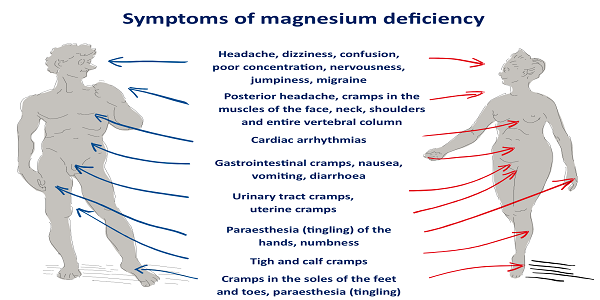Magnesium is an essential mineral that plays a crucial role in hundreds of biochemical reactions within the human body. Despite its importance, many people are unaware that they might be suffering from magnesium deficiency, a condition that can significantly impact overall health and well-being.
Understanding Magnesium Deficiency
Hypomagnesemia, or magnesium deficiency, occurs when an individual has abnormally low levels of magnesium in their blood. Typically, normal magnesium levels range between 1.3 to 2.1 mEq/L. Remarkably, approximately 45% of the U.S. population does not get enough of this vital mineral, making it a widespread health concern.
Common Causes of Magnesium Deficiency
Several factors can contribute to low magnesium levels, including:
- Chronic alcohol use
- Severe burns
- Chronic diarrhea
- Excessive urination
- Certain medical conditions like celiac disease
- Medications such as diuretics and proton pump inhibitors
People with underlying health conditions are particularly susceptible. For instance, individuals with malabsorption syndromes like inflammatory bowel disease may struggle to absorb magnesium effectively, increasing their risk of deficiency.
Recognizing the Symptoms
Magnesium deficiency can manifest through various symptoms, many of which are often overlooked or attributed to other conditions. Some common signs include:
- Muscle spasms and cramps
- Persistent fatigue
- Muscle weakness
- Numbness
- Abnormal eye movements
Notably, muscle cramps occur in approximately 70% of individuals with magnesium deficiency. These symptoms can significantly impact daily life, making it crucial to recognize and address the underlying issue.
Diagnosing Magnesium Deficiency
Healthcare providers typically diagnose magnesium deficiency through a comprehensive approach that includes:
- Physical examination
- Blood tests to measure magnesium levels
- Additional tests for calcium and potassium
- Urine tests
- Electrocardiogram (ECG) to assess heart function
Blood tests can accurately diagnose magnesium deficiency in about 90% of cases, providing a reliable method for identification.
Treatment and Management
Treating magnesium deficiency depends on the severity and underlying cause. Common treatment options include:
- Oral magnesium supplements
- Intravenous (IV) magnesium administration
- Addressing underlying medical conditions
- Medications to manage specific symptoms
In severe cases, IV magnesium can correct deficiency within 24-48 hours. For individuals with conditions like celiac disease, a gluten-free diet might be recommended to improve magnesium absorption.
Prevention Strategies
Preventing magnesium deficiency involves a multifaceted approach:
- Consume magnesium-rich foods like dark leafy greens, nuts, and whole grains
- Manage stress levels
- Stay hydrated
- Use electrolyte drinks during intense physical activity
- Consult healthcare providers about potential medication interactions
Implementing these strategies can reduce the risk of magnesium deficiency by up to 30%.
When to Seek Medical Attention
If you experience persistent muscle cramps, fatigue, or other symptoms associated with magnesium deficiency, it’s crucial to consult a healthcare professional. Untreated severe magnesium deficiency can potentially lead to serious complications, including cardiac and respiratory issues.
By understanding magnesium deficiency, recognizing its symptoms, and taking proactive steps, individuals can maintain optimal health and prevent potential long-term complications.






